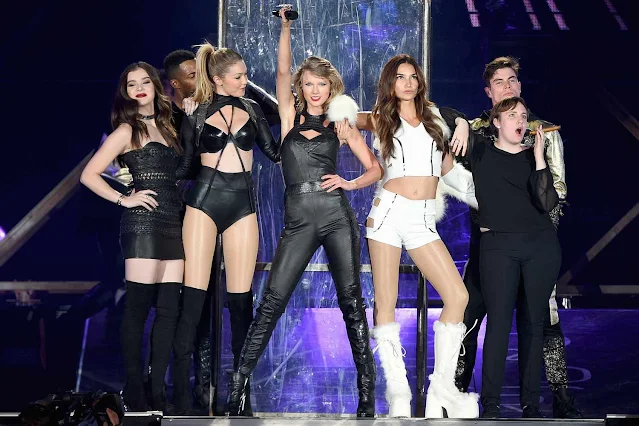The Origins of the Squad
The concept of Taylor Swift's squad began to gain attention around 2014 when she started appearing in public and on social media with a consistent group of female friends. This group included the likes of supermodels Karlie Kloss, Gigi Hadid, and Cara Delevingne, actresses Lena Dunham and Hailee Steinfeld, and musicians like Selena Gomez and Lorde. The squad became particularly prominent during Swift’s “1989” era, with the group often appearing in music videos, on stage during tours, and in various public appearances.
Swift has always emphasized the importance of friendship, and her squad seemed to be an extension of this value. It was a group of successful, talented women who supported each other, embodying the idea of female empowerment and solidarity. This was particularly evident in the music video for "Bad Blood," where many members of the squad appeared as powerful, badass characters.
The Appeal of the Squad
For many, Taylor Swift's squad was a refreshing representation of female friendship in the entertainment industry. In a world often characterized by rivalry and competition, especially among women, Swift's squad was a testament to the idea that women can be each other's biggest supporters. The squad's public appearances, social media posts, and camaraderie provided a positive narrative of female bonding that resonated with fans.
The squad also had a significant influence on popular culture. It became a trend to have a "squad" of one's own, with the term entering the everyday lexicon. Social media feeds were filled with images and posts about "squad goals," and many young women were inspired to cultivate their own tight-knit groups of friends.
Moreover, the members of Swift’s squad were successful in their own right, which added to the allure. They were role models for young women, each representing different facets of achievement, whether in fashion, music, or acting. The squad became a symbol of what it meant to be young, successful, and empowered.
The Criticism
Despite the positive aspects, Taylor Swift's squad has not been without its critics. Some have accused the group of being exclusionary, arguing that it promotes an unrealistic and narrow ideal of friendship. The members of the squad are overwhelmingly white, thin, and conventionally attractive, which has led to accusations of a lack of diversity.
This criticism was particularly pointed during the height of the squad's visibility. Some argued that the group perpetuated the idea that success and worthiness were tied to specific physical and social attributes. The squad was seen by some as a clique that, while promoting the idea of female friendship, also highlighted the exclusivity and hierarchy often found in high school social structures.
Additionally, the squad’s overt visibility and the media’s fascination with it led to scrutiny and skepticism. Some questioned the authenticity of the relationships within the group, suggesting that the squad was more of a branding exercise than a genuine circle of friends. This was exacerbated by the fact that some former members seemed to distance themselves from the squad over time, fueling rumors of falling-outs and feuds.
The Evolution of the Squad
In recent years, Taylor Swift's squad has been less visible. While the pop star still maintains close relationships with many of the original members, the intense public focus on the squad has waned. This could be due to a variety of factors, including Swift's own evolving image and the natural progression of friendships over time.
Swift herself has undergone significant changes in her public persona, particularly with the release of her albums “Reputation” and “Lover,” and more recently with “Folklore” and “Evermore.” These albums reflect a more introspective and mature Swift, and this evolution may have contributed to the shift away from the highly visible, glamorous squad.
Moreover, as the members of the squad have pursued their own careers and lives, the dynamics of the group have naturally changed. Some members have started families, others have moved to different countries, and all have continued to grow in their respective careers. The squad, once a symbol of a specific moment in Swift's career, has transformed along with the individuals within it.
The Legacy of the Squad
While the squad may no longer dominate headlines as it once did, its legacy remains. The idea of female friendship and empowerment that it promoted continues to be a significant theme in Swift’s work and in popular culture more broadly. The squad also paved the way for other celebrities to publicly embrace their friendships, leading to a broader acceptance of the idea that women can and should support each other in both personal and professional realms.
The squad’s influence can also be seen in the way it changed the conversation around celebrity friendships. It encouraged a more open discussion about the importance of support networks, particularly for women in high-pressure, public-facing careers. The visibility of the squad also challenged the stereotype of women in Hollywood as being catty or competitive, showing that collaboration and mutual support were not only possible but also powerful.
Conclusion
So, what do we think of Taylor Swift's squad? It’s a mixed bag, depending on whom you ask. For some, it was an inspiring example of female friendship and empowerment, while for others, it was a symbol of exclusivity and superficiality. Regardless of where one stands, there’s no denying the cultural impact the squad had during its peak. It challenged and shaped narratives around female relationships in the public eye and left a lasting imprint on how we think about friendship, celebrity, and the intersection of the two.
In the end, Taylor Swift’s squad was more than just a group of friends; it was a cultural phenomenon that sparked conversations about everything from diversity to authenticity. And while its visibility may have faded, the conversations it started continue to resonate.








Social Plugin